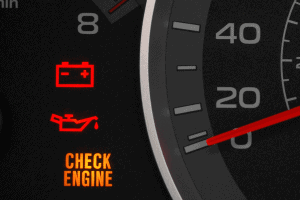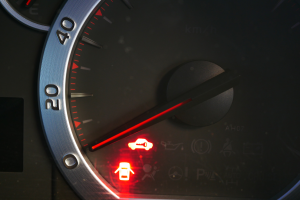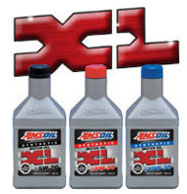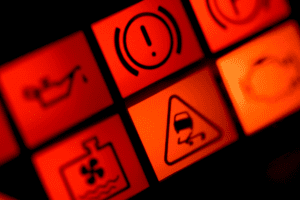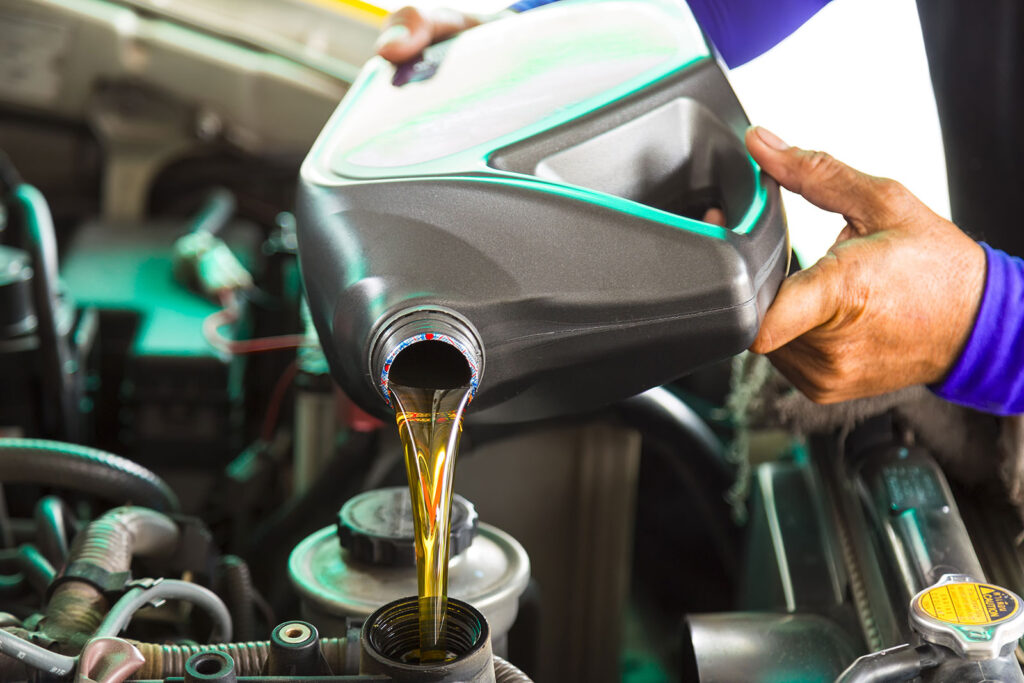If you’ve ever spent much time learning about how your car’s motor works, you likely can appreciate that each piece of the mechanics plays a crucial role in the overall function.
Keeping your car in good working condition is crucial to maintaining peak efficiency as well as continuing its lifespan.
It is a fundamental way you can take care of the significant investment of an automobile.
From tire pressure issues to motor oil problems, the good news is your car is built with systems sensitive enough to register mechanical failures the minute they arise.
Are you looking for more ways you can treat your car right?
Why not start with premium AMSOIL synthetic motor oil for regular oil changes in your car, truck, or motorcycle?
(For more information on the differences between synthetic and conventional motor oil, check out our recent article on the topic.)
To browse Lube Oil Sales’ inventory of high-performance AMSOIL motor oils, click here to get started!
Engine temperature warning light
The engine temperature light is an important indicator on a car’s dashboard that alerts the driver to potential issues with the engine’s temperature.
When this warning light illuminates, it signifies that the engine is overheating or approaching unsafe temperatures.
It is crucial to address this warning promptly to prevent severe engine damage and potential breakdowns.
Here are some key points to understand about the engine temperature light:
Overheating Causes: The engine can overheat due to various reasons, including a malfunctioning cooling system, low coolant levels, a faulty thermostat, a radiator leak, a broken water pump, or a blocked radiator.
Any of these issues can disrupt the engine’s cooling process, leading to an increase in temperature.
Immediate Action: When the engine temperature light illuminates, it is essential to take immediate action to prevent further damage.
Safely pull over to a safe location away from traffic and turn off the engine.
Continuing to drive an overheating engine can result in severe damage and even engine failure.
Allow Cooling Time: After stopping the vehicle, allow the engine to cool down before attempting to open the hood or inspect the cooling system.
Opening the hood too soon can release steam or hot coolant, which can cause burns.
It is recommended to wait until the engine temperature returns to a safe level before proceeding.
Check Coolant Level: Once the engine has cooled down, visually inspect the coolant level in the coolant reservoir tank.
If the level is low, it may indicate a coolant leak or other issues with the cooling system.
Add coolant as necessary, but only when the engine is cool to avoid injury from hot coolant.
Seek Professional Assistance: If the engine temperature light continues to illuminate after refilling the coolant or if the coolant level is consistently low, it is advisable to seek professional assistance from a qualified mechanic.
They can diagnose the underlying cause of the overheating and perform necessary repairs or maintenance on the cooling system.
Preventive Measures: To prevent engine overheating in the future, it is important to practice regular vehicle maintenance.
This includes checking the coolant level regularly, inspecting for any coolant leaks, ensuring proper functioning of the radiator, and replacing the thermostat as recommended by the vehicle manufacturer.
Remember, the engine temperature light should never be ignored.
Ignoring it can lead to severe engine damage, expensive repairs, and potential safety hazards.
Acting promptly and seeking professional help when needed can help maintain the health of your engine and ensure a safe driving experience.
Diesel car dashboard symbols and meanings
Diesel vehicles have specific dashboard symbols that convey important information to the driver.
Understanding these symbols and their meanings is crucial for the safe operation and maintenance of a diesel car.
Here are some common diesel car dashboard symbols and their explanations:
Glow Plug Indicator: This symbol resembles a coil and indicates that the glow plugs in the engine are in operation.
Glow plugs are used in diesel engines to preheat the combustion chambers for easier starting.
The glow plug indicator should illuminate when the ignition is switched on and turn off once the engine is ready to start.
Check Engine Light: The check engine light is a generic symbol that looks like an engine block.
It indicates a problem with the engine or emission control system. When this light illuminates, it is advisable to have the vehicle inspected by a qualified mechanic to diagnose and resolve the underlying issue.
Water in Fuel Indicator: This symbol typically features a droplet of water and indicates the presence of water in the fuel system.
Water in the fuel can lead to engine damage and reduced performance.
If this symbol appears, it is important to drain the water from the fuel system as soon as possible.
Low Fuel Warning: The low fuel warning symbol resembles a fuel pump or a gas pump icon.
It illuminates when the fuel level is critically low and serves as a reminder to refuel the vehicle.
Battery Warning Light: The battery warning light looks like a battery symbol and indicates a problem with the vehicle’s charging system.
It could mean a faulty alternator, a weak battery, or a loose connection.
It is recommended to have the charging system checked by a professional if this symbol appears.
Oil Pressure Warning: This symbol features an oil can or an oil drop and indicates low oil pressure in the engine.
It signifies a potential problem with the lubrication system, which can lead to severe engine damage if not addressed promptly.
Stop the vehicle safely and check the engine oil level. If it is adequate, seek professional assistance.
Coolant Temperature Warning: The coolant temperature warning symbol resembles a thermometer submerged in water and indicates that the engine coolant is overheating.
It is crucial to address this warning immediately to prevent engine damage. Pull over to a safe location, allow the engine to cool down, and check the coolant level.
Seek professional help if needed.
These are just a few examples of common dashboard symbols found in diesel vehicles.
It is important to consult the vehicle’s owner’s manual for a comprehensive list of symbols specific to your make and model.
Understanding these symbols will help you respond appropriately to any issues that may arise, ensuring the safety and proper functioning of your diesel car.
Car dashboard symbols
Car dashboard symbols are visual indicators displayed on the vehicle’s instrument cluster to provide important information and alerts to the driver.
Understanding these symbols is crucial for safe and efficient operation of the vehicle.
While the specific symbols may vary depending on the make and model of the car, here are some common dashboard symbols and their meanings:
Check Engine Light: This symbol, usually shaped like an engine block, indicates a problem with the engine or emission control system.
When this light illuminates, it is advisable to have the vehicle inspected by a qualified mechanic to diagnose and resolve the underlying issue.
Battery Warning Light: The battery symbol represents an issue with the vehicle’s charging system.
It could indicate a faulty alternator, a weak battery, or a loose connection.
If this light appears, it is recommended to have the charging system checked by a professional.
Oil Pressure Warning: This symbol, often resembling an oil can or an oil drop, indicates low oil pressure in the engine.
It signifies a potential problem with the lubrication system, which can lead to severe engine damage if not addressed promptly.
Check the engine oil level and seek professional assistance if needed.
Coolant Temperature Warning: The symbol usually depicts a thermometer submerged in water and indicates that the engine coolant is overheating.
It is important to address this warning immediately to prevent engine damage.
Stop the vehicle safely, allow the engine to cool down, and check the coolant level. Seek professional help if necessary.
Tire Pressure Monitoring System (TPMS): This symbol appears as an exclamation mark inside a horseshoe shape and indicates low tire pressure.
It signifies that one or more tires have insufficient air pressure. Check the tire pressure and inflate the tires to the recommended level as soon as possible.
ABS Warning: The ABS (Anti-lock Braking System) warning light represents an issue with the vehicle’s braking system.
It indicates a malfunction in the ABS, which could affect the effectiveness of the braking system.
It is important to have the vehicle inspected by a professional to diagnose and rectify the problem.
Airbag Warning: This symbol features an image of a person with an inflated airbag and signals a problem with the airbag system.
When this light illuminates, it indicates a fault that requires attention.
Promptly have the vehicle inspected by a qualified technician to ensure proper airbag functionality.
These are just a few examples of common dashboard symbols.
It is important to consult the vehicle’s owner’s manual for a comprehensive list of symbols specific to your make and model.
Understanding these symbols will help you respond appropriately to any issues or alerts that may arise while driving, ensuring your safety and the proper functioning of your vehicle.
